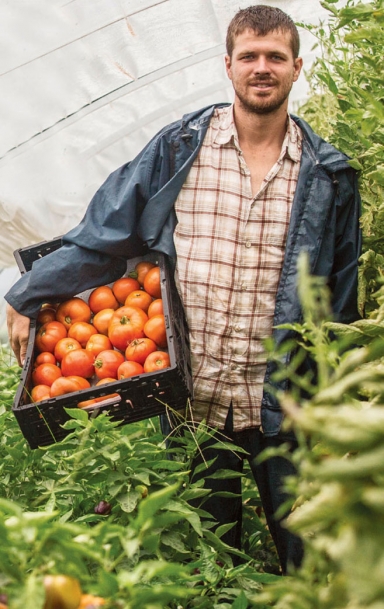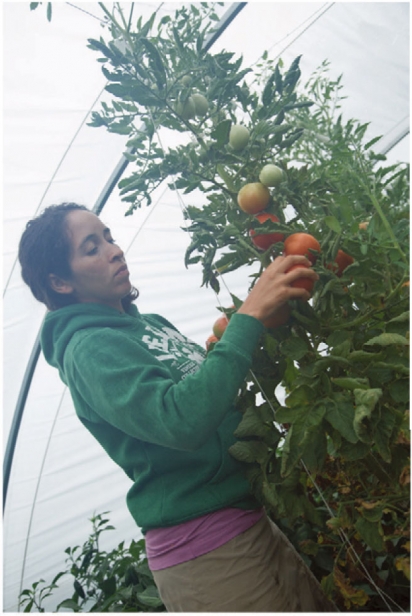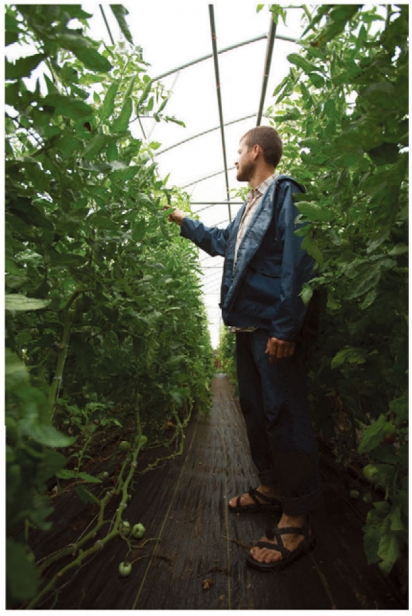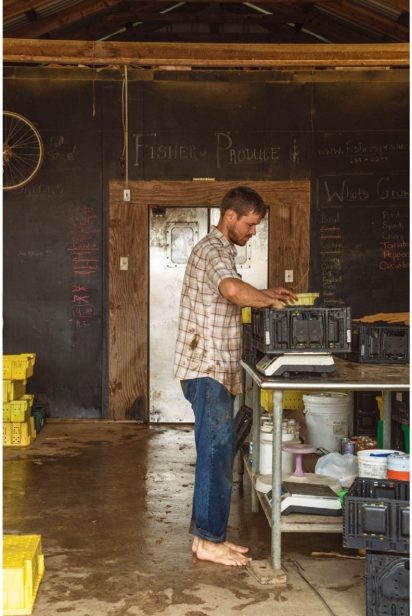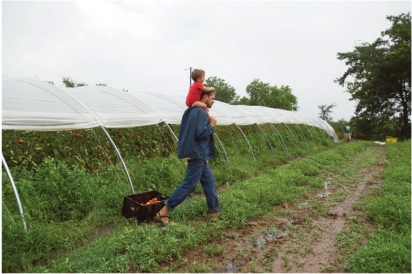Fisher Farms
The best of what’s around isn’t only about what’s on the table, but how it got there.
The Fisher Farms story is one that, to many agrarians, probably treads along the lines of a fairy tale. There’s lore, tradition, romance, perseverance and little magic in the mix. But to really understand what makes Luke and Chantée Fishers operation so special, you’ve got to go all the way back to the beginning, to the roots—dirty and gnarled, buried deep in the soil.
Luke Fisher is a descendant of a generations-old Oklahoma farming operation—one that reaches back to 1905, when Luke’s great-great-grandfather purchased the plot of land the Fishers now farm.
“The land has been in our family for—what’s that—110 years?” he counts. “So it’s kind of in my blood.”
Today, the Fisher name is a household one amongst Oklahoma locavores, with the original farmland divided among several different family operations. With eggs, cattle, grains, hay and feed in the works, the Fisher family has the means to satisfy just about any agricultural need, but Luke and his wife Chantée’s focus is on goodness from the garden. A CSA basket from Fisher Farms comes chock-full of earthly goods, including juicy tomatoes, sweet corn, potatoes, beets, broccoli, strawberries and, of course, asparagus.
Luke’s farm is well known for its asparagus production, and the spiky green spears have played out as a theme in the Fisher story for decades. As Luke describes it, his father was a “pioneer” in Oklahoma asparagus production.
Back in the 1990s, Luke’s father took on growing asparagus as a side project of sorts for extra money during the spring season. Growing up, there was always a healthy garden growing on their land, flush with sweet corn, tomatoes and other plants that would make their way to the produce stands at the feed store and onto the tables of friends and strangers. The practice stuck with Luke, and would eventually come full circle years later on his own farm.
Fast-forward 10 years, when a newly graduated Luke was deciding between heading straight to college and spending a year doing mission work. The latter option won out, and Luke headed to Zambia to volunteer at a school as a children’s public health worker. His experience sparked a love of nursing, and after returning home he picked up a nursing degree and worked as one for a year and a half. But Luke says his love for the land was never far from his mind.
“I was very, very avidly gardening that whole time. I was a sharecrop gardener,” he jokes. “I gardened in people’s backyards.”
Luke’s gardening pursuits grew, and gardening graduated into growing—a more refined practice than simple hobbyist gardening. As he got deeper into cultivation, it wasn’t long before his roots in asparagus sprang up again.
“I started critically thinking about that time in life—about starting a family, these kinds of things—and I realized that really, the life that I wanted was agrarian. So I planted six acres of asparagus back. I could see that it would be an even better deal for me in the modern era than it had been for my dad a few decades ago.”
Armed with a healthy acreage of asparagus to tend, it wasn’t long before the other side of his desired situation started fall into place. Today, Chantée works alongside Luke, keeping the Fisher operation up and running while balancing the demands of mothering two kids. And while Chantée doesn’t come from a farming family in the traditional sense, working the earth is still deeply entwined in her story.
“I spent most of my childhood in the country, in the mountains of New Mexico,” she recalls. “My dad is a doctor, but my mother loved gardening, and she passed on that love to me. So I spent lots of time in the garden.
“And when I met Luke ...”
“ That’s how I got her to marry me!” he interjects, visibly proud of himself.
“It was like a dream come true to me to marry a professional gardener,” she laughs, bouncing her oldest baby on her knee.
I catch her and Luke exchanging playful gazes—the kind that suggest a joke hanging in the air that only they are in on—and I have absolutely no problem believing her.
For Luke and Chantée, the farming lifestyle is an intentional decision to be made and embraced daily. The ability to work and live on the farm, to pull pieces of it out to share—product, life and all—with others is an obvious motivation.
“I love the lifestyle,” Chantée insists. “And I really appreciate being able to raise our kids on the farm.”
The Fishers’ youngest is still too young to experience the joys of life on the farm, but their toddler son, Hudson, has settled into his role as co-gardener quite nicely.
“He picks lettuce and radishes and eats them dirt and all. Just right out of the ground. It’s great. He’s living the ultimate life, and he doesn’t even know it yet.”
When they were first starting out, the flexibility of Luke and Chantee's asparagus gave them the flexibility of other pursuits, including volunteerism. Today, they still split their time between the farm during harvest, and Democratic Republic of Congo during fall and winter, where they help train Congolese nurses in primary dental care alongside the Ministry of Health. It’s another piece to their varied life, and one that’s as much a part of their story as the farm itself.
When back home, Luke started experimenting with plants beyond the spiked stalks of asparagus, and began to grow the foundation of their current operation.
“Once I got back into the asparagus, I started adding all the accessories: I planted a few vegetables, and was trying to figure out ways to sell them. I started making friends with people going to the farmers’ markets, and at the Brookside Market. I started my first CSA season in 2010. And it’s kind of grown from there.”
This season marks the Fishers’ sixth year in their CSA program. Each spring and summer they supply about 60 families with fresh produce—sometimes chosen by the Fishers, sometimes hand-selected by members at their market booth and farm stand. Through it all, Luke and Chantée strive to keep their produce as natural and clean as possible. Thus, it comes as no surprise that they’re major proponents of GMO-free farming practices.
“I am very philosophically opposed to the genetically modified, agri-chemical business-industry model,” Luke says. He chooses his words deliberately, careful to explain what he sees as the root of the issue.
“You know, seed companies are owned by chemical companies, and they produce seeds with the purpose of selling chemicals. I don’t know ... I guess ... dependency is a form of slavery, in a sense, and I prefer to be free and independent.”
Their stance on the matter correlates strongly with their personal values. In considering the unknowns and guesswork of altering what comes out of the earth, for them, it seems the question almost becomes, ‘Why tamper with something already made perfectly?’
“I’m not sure if people are as wise as our original creator,” Luke muses. “I’m all for selective breeding, and producing better varieties. I don’t know— genetically modified might be taking it a step too far. There might a bit of hubris there.”
Despite building a thriving local farming operation, hubris is one thing that seems intentionally absent from Luke and Chantée’s business and persona. Blame it on the reality of hard labor, or the close-knit community of the Green Country farm scene. Either way, they’re happy to package their bounty for a small collection of committed locals, and for markets like Reasor’s and Whole Foods. And while a wider reach would be nice, Luke and Chantée are careful to keep focused on the personal connection inherent in what they do, and their motivation for pursuing it.
“Basically, in a very real way, I feel called by my maker to be a steward of the land He has given me,” Luke says. “So I feel I have inherited a blessing of being born on a farm. I’ve been entrusted with this land, and it is my responsibility—and at the same time, my privilege—to care for it.”
For Chantée, the motivation is also rooted in responsibility, and in giving back.
“I have a real burden for consuming and sharing good, quality food,” she says. “It’s exciting to me to get up in the morning, to harvest early before the sun even comes up, and pack our CSA bags or go to market and meet people, provide food for their tables, and share the blessing that we’ve been given, that we’re privileged to live with every day.
“And,” she continues, “I appreciate being able to live in such a way that everything is so real and genuine. And our kids can see that. They’re going to be raised in an environment where they don’t really know anything different. And they’ll learn as they get older different ways to live, but hopefully—like Luke did—they’ll turn around and say, ‘This is what I want. This is the best thing that there is.’”
Indeed, the best there is—the best of what’s around.
All in the Family
Wondering about the connection between Fisher’s Produce and local other operations of the same name? One hundred and ten years ago, Henry Will Fisher moved his family to a large plot of Oklahoma farmland. Over a century later, his descendants have since tilled it into several successful businesses of their own. For more from the Fisher family, check out these operations:
Fisher Farms and Feed Store: A beef, wheat, corn, and soybean farm, and a full-service feed and hay store. Opened 30 years ago by Luke’s father, Kenneth Fisher and his late father, Russell Fisher, this is the farm that sparked Kenny’s entrance into asparagus, and the business that brought Luke into the Fisher farming fold.
Kenneth Fisher, 918.367.3931
Fisher’s Eggs: A family-owned regular and cage-free egg operation serving the greater Tulsa area through restaurants, markets, health food stores, schools, nursing homes, and more. Fisher Eggs are proudly raised antibiotic, drug, and hormone free and are fed an all-grain diet free of meat by-products, mixed onsite at Fisher’s Mill.
Mark Fisher, 918.367.6382
Fisher’s Mill: A full-service mill and feed store operated on the original Fisher land plot. Fisher’s Mill sells grain and feed for cattle, swine, horses, and poultry.
David Fisher, 918.367.6382
Be on the lookout for more on these purveyors in future issues.


